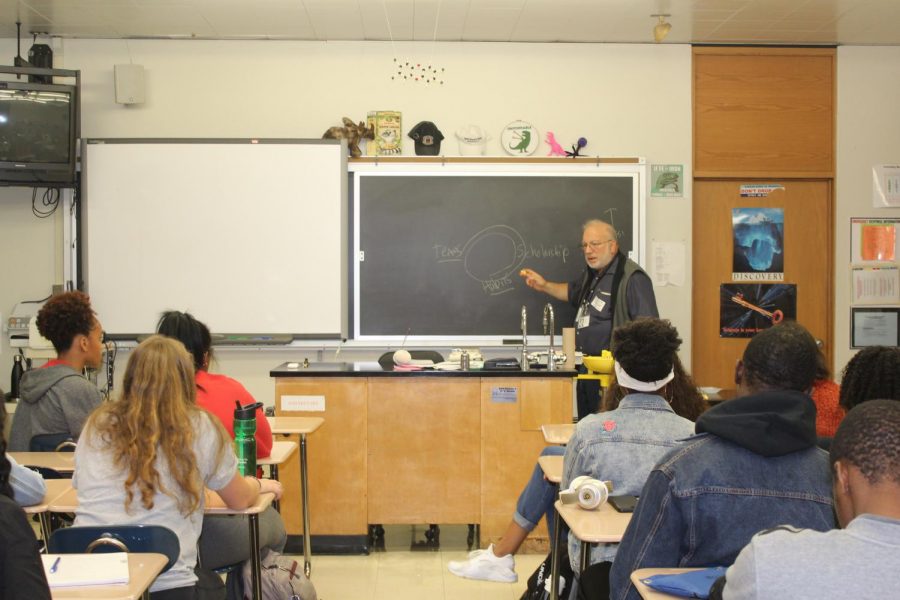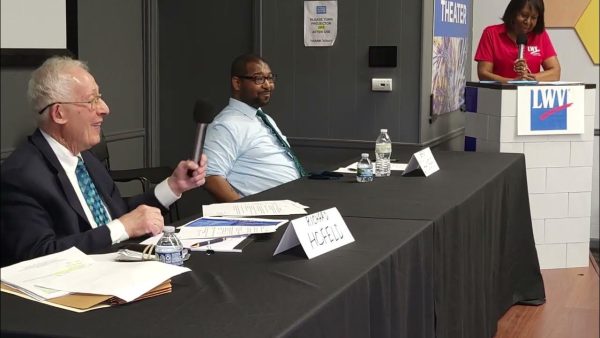Back to the past
A look back on the high school experiences of the Class of 1968
Avid researcher: Dr. Howard Fingert giving a presentation in Mr. Knoepke’s 2nd period AP Biology class on Sept. 28. Fingert discussed how he entered into the medical field and some of his research with students.
This past Saturday on September 29, the Class of 1968 had a reunion celebrating 50 years since graduating from H-F. A few members of the class visited select classrooms the day before to speak with students.
One of the speakers was oncologist and hematologist Dr. Howard Fingert. At H-F Fingert was a member of Speech, Student Government, and the swim team. He then went on to receive his undergraduate degree in religion at Brandeis University with a minor in pre-med. Later he went to medical school at the University of Illinois and afterwards became an assistant professor at Harvard.
“In my high school years there was a lot of wonderment, inspiration, and excitement about opportunities, politics, social change, and medical sciences,” Fingert said. “The foundations of modern medicine totally changed, those things were just emerging when I was in high school. Since so much of it [technology] has matured I don’t know if the typical student sees and feels the same experience I had in high school.”
Fingert also said he credits H-F with teaching him valuable morals while he was in college during the Civil Rights protests.
“I was involved with some of the protests, some happened at Brandeis,” Fingert said. “And I applied what I learned at H-F which was the value of thinking ahead, articulating, challenging concepts, and recognizing misconceptions.”
In 1968, there wasn’t much diversity at H-F, alumnus Bob Moorehead said. The first black teacher came to the school during his junior year and the first black student enrolled during his senior year.
“There were no black students in the Class of 1968, as far as I’m aware we had one student who was from a Chinese background and another who has a Hispanic last name, otherwise it was all white,” Moorehead said. “When the first black student came to the school, my attitude and the attitude of all the kids I knew was curiosity, there were no big protests or commotion about it that I know of. That was all it was the first few days of school, it didn’t matter after that.”
In 1964, when Moorehead was a freshman, the Civil Rights Act was passed and one of the effects was that discrimination in housing was banned.
“It used to be that if you were white a realtor would show you a house in Homewood or Flossmoor and if you were black a realtor would show you a house in Chicago Heights or Hazel Crest. The 1964 Civil Rights Act banned this,” Moorehead said. “By the end of the time I was at H-F the earliest stages of integration occurred.” It was interesting to see the effect of the law a few years later.”
In addition to this, 1968 alumna Jean Snuggs said it was during the Civil Rights protests that she recognized how naive and sheltered she was, especially when she went to the University of Illinois, which was heavily involved in the protests.
“I just assumed that racial discrimination was a thing of the past, to recognize that wasn’t true was really eye opening for me, it hit everybody. Also, it was the first time I thought I was discriminated against for being a woman in terms of my opportunities,” Snuggs said.
Snuggs also said she changed her career route because she realized that there were a lot of inequities in society.
“I was raised in a very scientific household and when the awareness of the civil rights movement came to me over time I drifted into teaching because I recognized how that was equally as important in the world in terms of equipping others to be successful,” Snuggs said. “That became a more important route for me.”
In 1968 there were no girls extracurricular activities at H-F and all of Illinois high schools. This didn’t change until Title IX was passed in 1972. The law stated that “No person in the United States shall, on the basis of sex, be excluded from participation in, be denied the benefits of, or be subjected to discrimination under any education program or activity receiving Federal financial assistance.”
“Some other parts of the country allowed girls to play but not Illinois, it wasn’t just H-F,” Snuggs said. “At H-F I was involved in the Girls Athletic Association and we did intramurals here on campus. When I was a senior we were allowed to have sport days and go to another school and play against each other.”
It is safe to say the Class of 1968 experienced so much in a time when the world was changing in so many ways.






